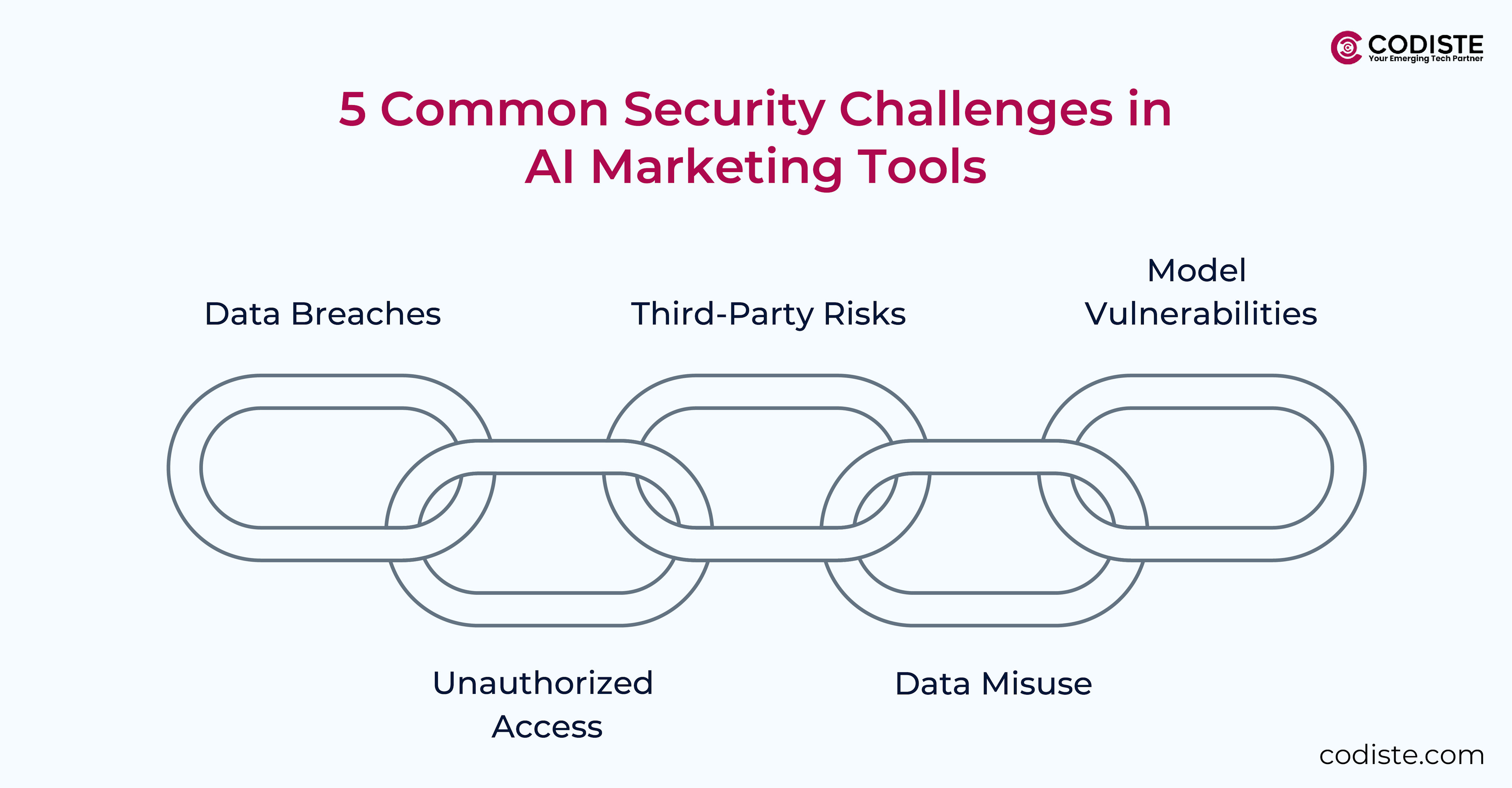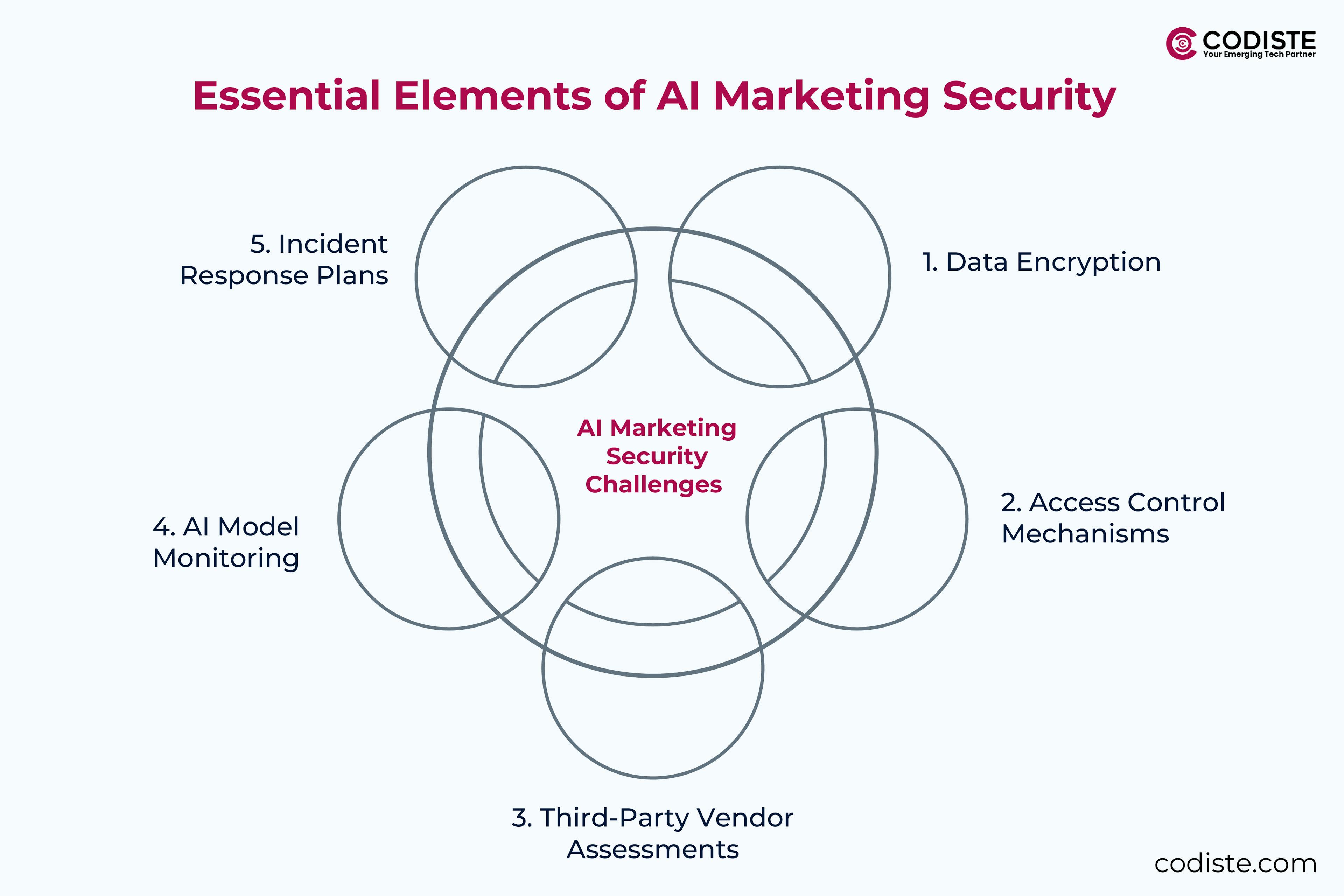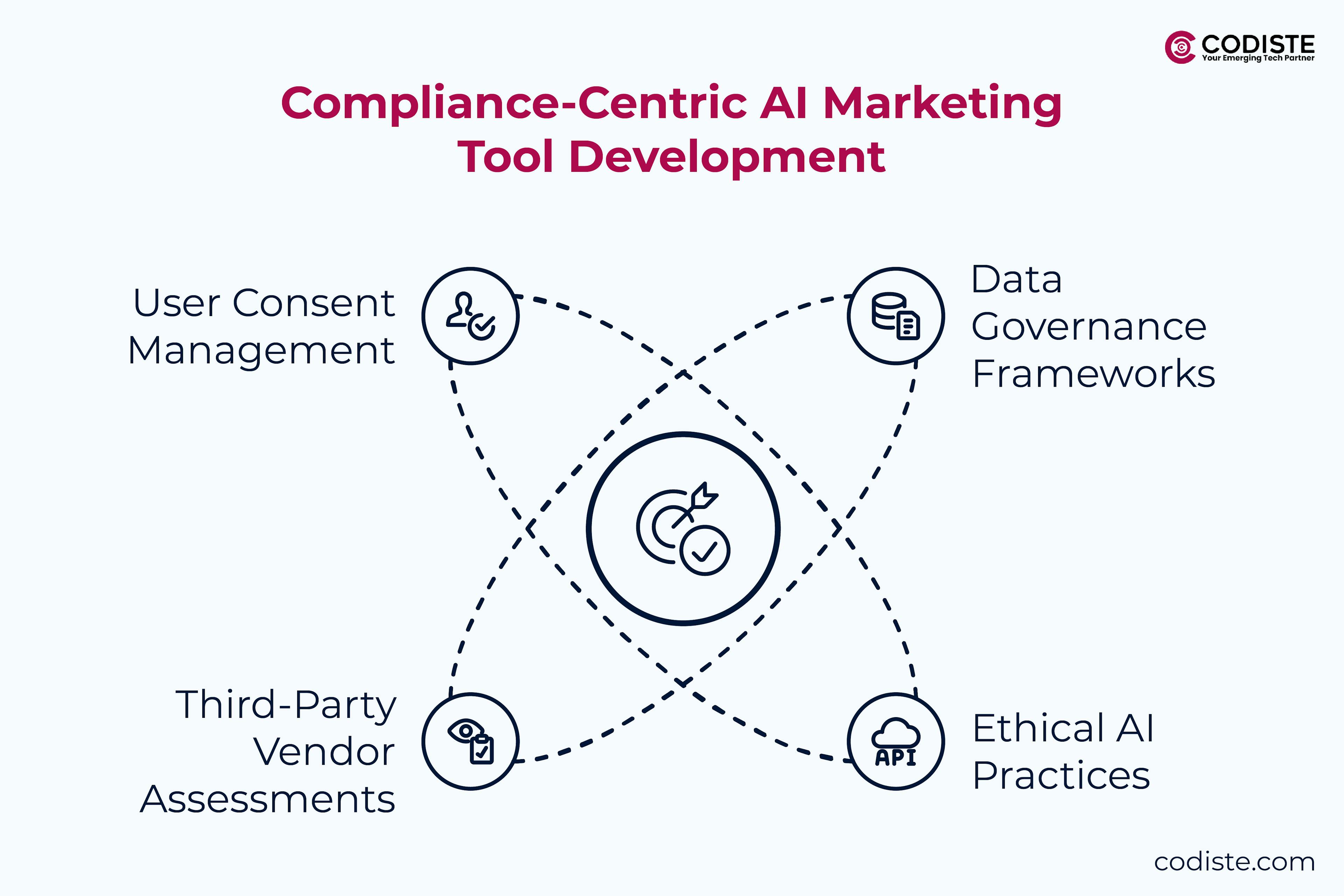
,
Have you ever thought about how artificial intelligence is changing marketing technologies?
Companies are using AI to automate tedious tasks, customize users’ experiences, and reap valuable knowledge from data analysis. Artificial Intelligence Marketing tools have become vital for companies to be at the top.
Nevertheless, this new technology also involves a great deal of accountability. AI tools can help identify emerging security concerns by analyzing historical data and current market trends. There is a potential danger for security breaches and compliance difficulties in AI tools that process large amounts of confidential customer information. Additionally, significant security risks are associated with AI platforms like DeepSeek, including data privacy issues and potential hacking vulnerabilities. Legal challenges and damaged reputations are the usual result of a company’s data leakage, misuse or insufficient regulation.
Let’s discuss through an example - how not complying with AI regulations can lead to huge damage. Deepfake technology can be used for financial fraud, and disinformation spreading by making fake videos. There was a deepfake video that wrongly represented Senior Minister Lee Hsien Loong promoting an investment product. This shows how AI can be used to shape public opinion, and spread fake news.
A meticulous approach to security and compliance is a must when it comes to developing AI marketing tools. So that user data is well-protected, trust is maintained and legal repercussions are avoided.
Understanding AI Marketing and Its Implications
AI marketing refers to the use of artificial intelligence (AI) technologies to enhance and automate marketing efforts. It involves the application of machine learning algorithms, natural language processing, and predictive analytics to analyze customer data, personalize marketing messages, and optimize marketing strategies. AI marketing has become increasingly significant in recent years, as it enables businesses to improve their marketing efficiency, enhance customer engagement, and gain a competitive edge in the market. By leveraging AI, companies can better understand consumer behavior, tailor their marketing efforts to individual preferences, and ultimately drive more effective customer interactions.
5 Common Data Security Challenges in AI Marketing Tools
1. Data Breaches
The user data stored by AI systems are large volumes and make them an easy target for cyber attacks. They can exploit vulnerabilities in databases or network systems. They can gain access to sensitive information, such as customer details like names, addresses, phone numbers, email addresses, etc.
Predictive analytics can help identify emerging security concerns by analyzing historical data and current market trends.
2. Unauthorized Access
Unauthorized users can get to sensitive data which poses a threat to business and privacy without proper access rights. Factors such as weak passwords, the absence of multi-factor authentication, and insufficient user permissions lead to systems being vulnerable to these security risks.

3. Third-Party Risks
Several AI marketing solutions come with the functionality to integrate with other platforms, such as analytics tools and cloud storage providers. The use of weak security procedures by these partners might be the cause of some extra vulnerabilities that companies face. A single unprotected vendor can be a way for hackers to get into your whole system.
4. Customer Data Misuse
The unethical or improper processing of data, or data use without permission can give rise to ethical or legal problems, including personal customer information. Data misuse could happen when data is used for objectives other than those for which it was originally intended and without proper user consent.
5. Model Vulnerabilities
Adversarial attacks and biases can pose a risk to AI models. By using the wrong input data, we can obtain misleading or harmful results. They deliberately confuse AI systems with false information, hence wrong decisions can be made.
What is Marketing Tool Compliance?
Compliance in AI marketing tools refers to compliance with legal, ethical and regulatory guidelines of the stable handling of data. Customer relationship management (CRM) systems aid in personalizing customer interactions and improving data security practices. This in turn results that businesses can build AI tools in compliance with laws and ethical principles. Legal compliance is important for companies as it not only helps them from the aspect of law but also it is a good way to show users the organizations’ commitment to ethics.
Relevant Laws and Regulations
- GDPR (General Data Protection Regulation)
The law was formed to make organizations aware of the consumer data protection and privacy requirements that they are to abide by in the European Union. GDPR compliance for AI marketing tools enables data collection, user consent and secure data storage practices through transparency. AI tools can also enhance traditional digital marketing strategies by ensuring compliance with data protection laws. - CCPA (California Consumer Privacy Act)
Appropriate for the companies catering to the citizens of California, it provides people with the ability to decide what happens with their private information. The right for consumers to be informed, deleted or to opt-out of data sharing, shall be ensured by companies. - Other International Data Protection Laws
Many different countries around the globe have enacted regulations, namely Brazil’s LGPD and Canada’s PIPEDAl to guarantee privacy among users. The way to get this right is to keep up to date with the current rules for international businesses.
Do you want to convert your idea into secure AI development?
Key Aspects of Security and Compliance in AI Marketing Tool Development
AI marketing security
The key to ensuring AI marketing tool development security of the collected data through marketing tools based on AI is to establish a reliable, secure system for the protection of the collected sensitive data. Predictive analytics can help identify emerging security concerns by analyzing historical data and current market trends. The following are the key security aspects:

- Data Encryption
To stop someone who is not allowed to read it from the data, encryption is required. The reduction of risk is further achieved via anonymization techniques that remove identifiable information from datasets. Thus, it guarantees that in case of data theft, data cannot be traced back to the individual users. - Access Control Mechanisms
Utilizing multi-factor authentication (MFA), role-based access control (RBAC), and regular audits one can minimize unauthorized access risks and thus are best for system information management. The emphasis is on accessing vital data to those who need them, to lower the possibility of breaches. - Third-Party Vendor Assessments
Companies must carry out a security analysis before they make agreements with the service of a third-party provider to strictly comply with the security regulations. The most essential factor in the said process is the utilization of scheduled internal and external audits by the contract to outline security responsibilities. - AI Model Monitoring
Regular testing and monitoring of AI models are essential to recognize and mitigate vulnerabilities. This makes sure that ethical decision-making is automated and doesn’t let biases occur. A well-managed evaluation finds out the possible points of weakness even before anyone takes advantage of it. - Incident Response Plans
Every company should develop effective measures for dealing with security incidents in the case of potential breaches. This involves finding out exactly what’s been stolen, informing the people concerned, as well as taking the right action. Prompt response can prevent harm and keep the trust of the user stable.
Marketing AI Compliance
Following compliance frameworks means that data are handled ethically and following legal regulations. The principles applicable include:

- Data Governance Frameworks
A strong and efficient data governance plan guarantees that data is collected, stored, and processed in a manner that complies with the applicable regulations. It involves creating policies for data retention, data sharing, and user consent management. AI tools can enhance traditional digital marketing strategies by ensuring compliance with data protection laws. - Ethical AI Practices
Developers should prioritize transparency by explaining how AI algorithms make decisions. Users should have options to review or contest the AI-driven outputs. Clear communication on data usage policies can further enhance user confidence. - Third-Party Vendor Assessments
Ensuring third-party vendors respect the data protection regulations and ethics is of utmost importance for generalized compliance. The contracts must have a clear-cut definition of the compliance obligations and the data protection requirements. - User Consent Management
Acquiring proper consent for data usage from the users before taking their data is an urgent priority. Companies must give users control over their data preferences and avail themselves of the opt-out alternatives.
The Risks of Bias and Discrimination in AI Marketing
AI marketing is not without its risks, particularly when it comes to bias and discrimination. AI algorithms can perpetuate existing biases and discrimination if they are trained on biased data or designed with a particular worldview. This can result in unfair treatment of certain groups of customers, which can damage a brand’s reputation and lead to legal consequences. For example, AI-powered chatbots may be more likely to respond negatively to customers from certain racial or ethnic backgrounds, or AI-driven advertising may target certain groups with discriminatory messages. Addressing these biases is crucial to ensure that AI-powered tools promote fairness and inclusivity in all customer interactions.
The Importance of Transparency and Accountability in AI Marketing
Transparency and accountability are essential in AI marketing, as they enable businesses to ensure that their AI-powered marketing efforts are fair, unbiased, and respectful of customer data. Transparency involves providing clear and concise information about how AI algorithms work, how customer data is used, and how marketing decisions are made. Accountability involves taking responsibility for any mistakes or errors that may occur, and being willing to make changes to AI algorithms or marketing strategies if they are found to be biased or discriminatory. By prioritizing transparency and accountability, businesses can build trust with their customers, protect their brand reputation, and ensure compliance with data protection laws and regulations, such as the General Data Protection Regulation (GDPR) and the California Consumer Privacy Act (CCPA). This approach not only safeguards customer data but also aligns with ethical AI practices, fostering a positive brand voice and long-term customer loyalty.
Conclusion
Security and compliance are the pillars of AI marketing tool development. Data security establishes data privacy in AI marketing, prevents unauthorized access, and ensures a system’s stability. Customer relationship management (CRM) systems aid in personalizing customer interactions and improving data security practices. Compliance ensures proper data handling and promotes trust between the user and the company. AI Marketing Security and compliance are indispensable factors that need to be integrated into an organization right from the beginning. This makes sure that AI-driven solutions can come with being innovative and also responsible and trustworthy.
Going forward, security- and compliance-focused companies will have a competitive advantage in providing AI marketing solutions that are secure, reliable, and high-performance. AI tools can enhance traditional digital marketing strategies by ensuring compliance with data protection laws. In the last twenty years, technology has changed and it will keep on changing. So staying well-informed and careful about the secure and compliant AI Marketing Solutions development process will be an excellent step for the long-term success of any company.
By taking the necessary measures now, companies can secure the future of their AI marketing tools through AI. This makes sure that they comply with the ever-changing AI Tool Development Security standards and regulatory requirements.



The Ultimate Guide to Agentic AI and Agentic Software Development
Know more
What is Agentic AI? A Beginner's Guide to the Future of Software Development
Know more
AI in Customer Service: Trends & Predictions for 2025
Know more
